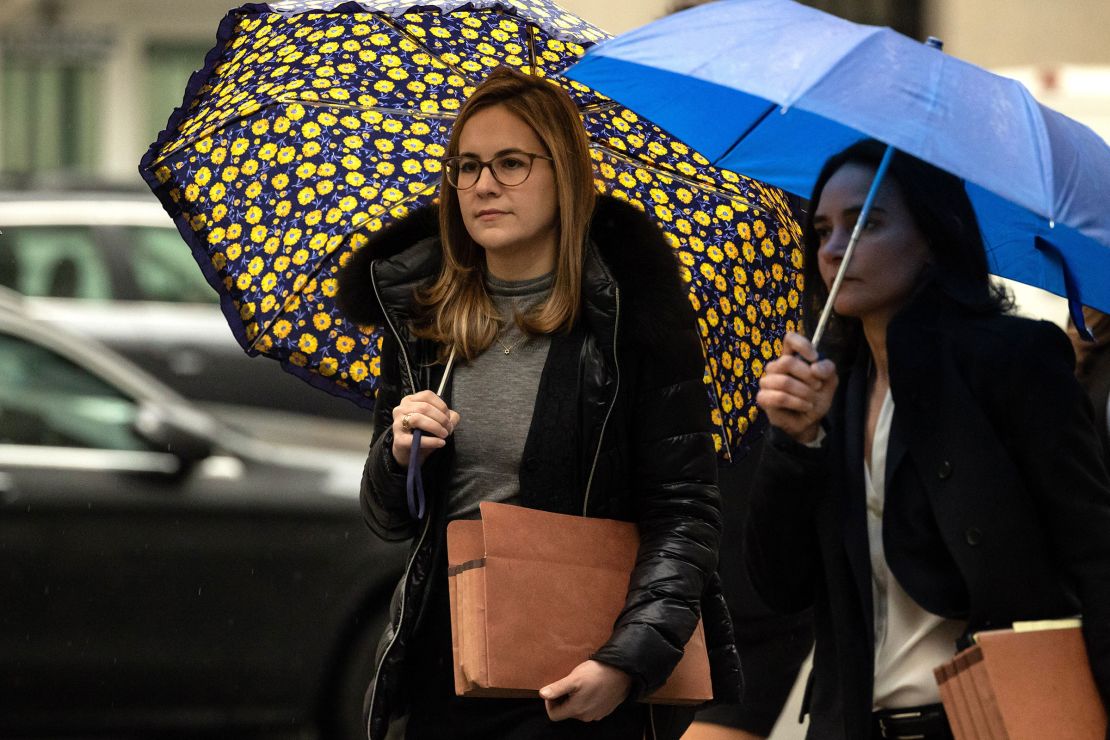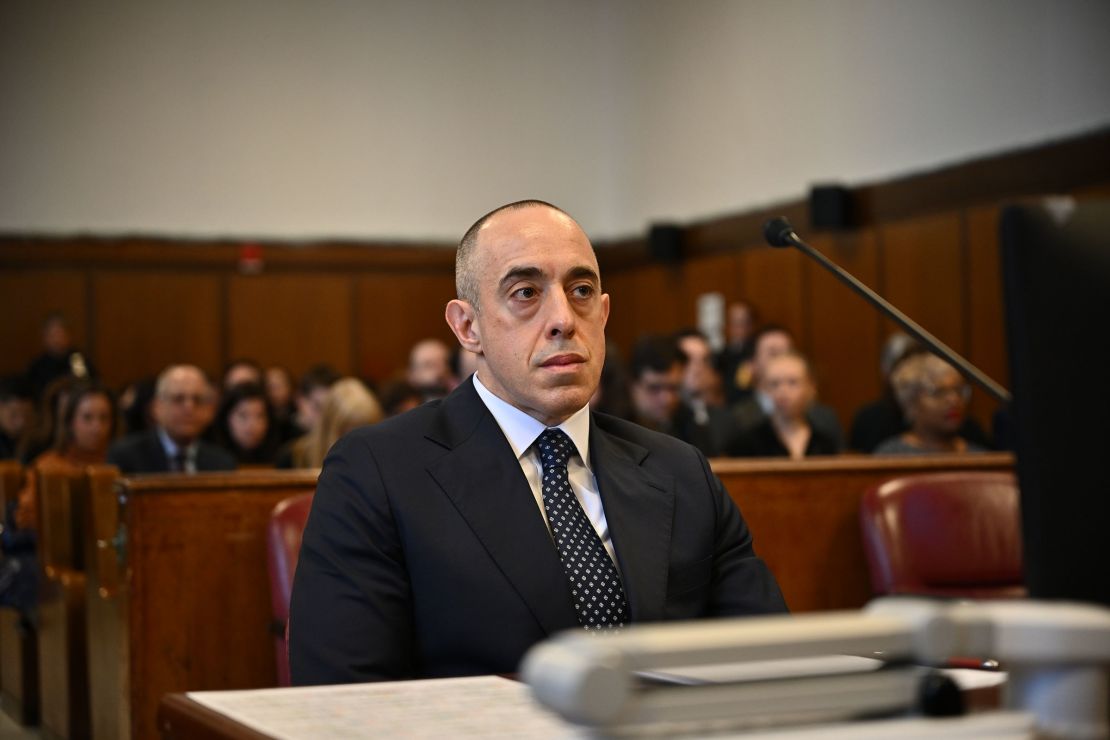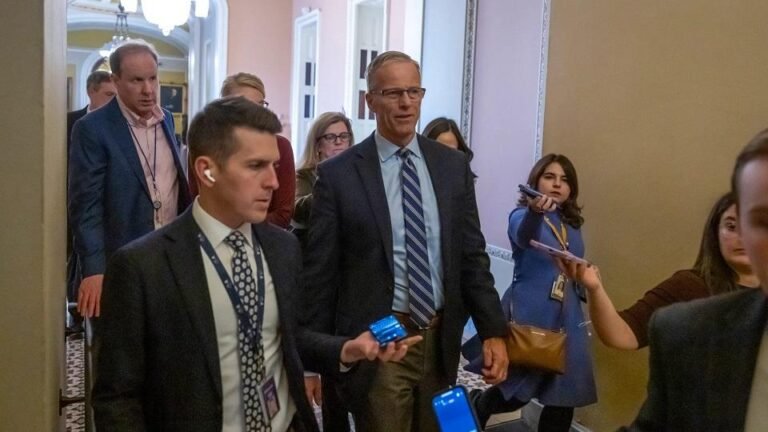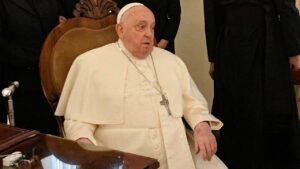The Justice Department is in crisis after the stunning resignation of the top prosecutor in Manhattan and five other senior officials over the DOJ’s decision to halt the prosecution of New York City Mayor Eric Adams on corruption charges.
It took less than a month for Donald Trump’s new DOJ to be engulfed by a controversy that supercharges concerns the president’s political aims are compromising the application of the law.
The drama — which recalls the Saturday Night Massacre of Watergate fame — represents the most high-profile effort yet by Justice Department officials to push back against Trump’s DOJ leadership, which is tasked with ending the “weaponization” of justice but which critics fear is perpetuating it.
Danielle Sassoon, who quit as the acting US attorney for the Southern District of New York, laid out stunning allegations of political interference in a letter to new Attorney General Pam Bondi. She said that the New York City mayor’s attorneys had repeatedly urged a quid pro quo under which Adams would help Trump’s hardline immigration policy if the case were dropped.
Sassoon wrote that the DOJ’s order for her to dismiss the case against the Democratic mayor was “inconsistent with my ability and duty to prosecute federal crimes without fear or favor and to advance good-faith arguments before the courts.”
An attorney for Adams on Thursday said the idea that there was quid pro quo is “a total lie” and said that the mayor’s legal team was asked by prosecutors whether the case had any bearing on national security and immigration enforcement “and we truthfully answered it did.”
Sassoon’s resignation, on the face of it, looks like a courageous act of a prosecutor sacrificing her promising career to thwart an apparent attempt to politicize justice.
Her claims add significant new context to a previous Justice Department memo, which argued that the prosecution “unduly restricted Mayor Adams’ ability to devote full attention and resources to the illegal immigration and violent crime” that it said rose under the Biden administration.
In itself, that memo was extraordinary since it suggested the prosecution was shelved because it conflicted with the president’s political priorities. The memo, for instance, said that the decision to drop the case was reached without assessing the “strength of the evidence or the legal theories on which the case is based.”

Sassoon’s complaints were met with a notably brusque letter from Emil Bove, the acting deputy attorney general, who is a former member of Trump’s legal team. He accused her of continuing to pursue “a politically motivated prosecution despite an express instruction to dismiss the case.”
Adams, who faces reelection this fall, was indicted in September on charges related to bribery, wire fraud, conspiracy, and soliciting campaign contributions from foreign nationals in exchange for political favors.
He has denied all wrongdoing and has frequently said that the prosecution was politically motivated payback for his criticism of the Biden administration’s failure to stem migrant arrivals in New York — a claim the Trump DOJ has embraced.
‘Taking politics out of the equation’
The administration’s handling of the Adams case seems to show that what Trump says is an effort to purge the “weaponization” of justice is already substituting political, rather than legal, rationales for prosecutorial decisions.
“I’m all for de-weaponizing the Justice Department,” Thomas Dupree, a former deputy assistant attorney general, who is also a conservative, told CNN’s Kaitlan Collins. “But the way you de-weaponize the Justice Department is by taking politics out of the equation.” Dupree said the letters suggested that “the administration was expressly infusing a law enforcement decision with political considerations.”
The controversy cast immediate doubt on the future of the DOJ’s attempt to dismiss the case against Adams since the developments are likely to come to the attention of Judge Dale Ho, who needs to sign off on the move.
Sassoon resigned before Bove could act upon his plan to fire her, two people familiar with the matter said.
But it will be hard for the DOJ to argue that Sassoon is a liberal deep-state critic of Trump given that she has impeccable conservative credentials and was only recently picked to lead the SDNY in an acting capacity by the president. She, for instance, clerked for the late Supreme Court Justice Antonin Scalia. In her letter, she said that the conservative icon was among her mentors who taught her to uphold the rule of law and advance the public good.
Trump denied that he had ordered the Justice Department to dismiss the indictment against Adams, a Democrat who evolved into a prominent critic of former President Joe Biden and built a personal relationship with the current president, who publicly said they were both victims of politicized justice.

“No, I didn’t,” Trump told CNN’s Kevin Liptak in the Oval Office. “I know nothing about it. I did not.” Moments later, Trump turned back to Liptak unprompted and added: “That US attorney was fired, I don’t know if he or she resigned, but that US attorney was fired.”
But the astonishing exchange of letters and the blistering language used by Bove and Sassoon mean Adams’ case may have the potential to escalate into a major scandal early in the new administration.
“We are beyond unusual here, this is thoroughly unprecedented,” CNN legal analyst Elie Honig, who once worked at SDNY, told Anderson Cooper. “We have never seen anything like this.”
In her letter, Sassoon argued that the DOJ did not have a valid reason for dismissing the case; said the evidence against Adams was sound; and warned the dismissal would “amplify, rather than abate, concerns about weaponization of the Department.”
She recalled her recently taken oath in which she vowed to well and faithfully discharge the duties of her office — and said that arguing for the dismissal of the Adams case in court would conflict with that promise.
In one of the most notable sentences of her letter to Bondi, Sassoon faults Bove’s arguments that the Adams case should be dismissed in return for his assistance in enforcing federal immigration laws. She said that the mayor had argued, and Bove agreed, that “Adams should receive leniency for federal crimes solely because he occupies an important public position and can use that position to assist in the Administration’s policy priorities.”
This is alarming because establishing such a principle could allow public officials to evade allegations of corruption by dint of their position — a scenario that would risk destroying public confidence in political and legal institutions.
Later in her letter, Sassoon took the argument about political weaponization of justice further, writing: “I understand my duty as a prosecutor to mean enforcing the law impartially, and that includes prosecuting a validly returned indictment regardless (of) whether its dismissal would be politically advantageous, to the defendant or to those who appointed me.”

Bove has now turned to the public integrity section at Justice Department headquarters to handle the dismissal, according to two people familiar with the matter. That step appears to have triggered the resignations of Kevin Driscoll, the top career prosecutor in the public integrity section, and John Keller, the acting head of the office. As many as three additional public integrity prosecutors also tendered their resignations later Thursday, according to two sources.
The cascading departures at the Justice Department recalled the “Saturday Night Massacre,” when several prosecutors and officials resigned following special prosecutor Archibald Cox’s refusal to honor President Richard Nixon’s request to drop a subpoena for White House tapes during the Watergate scandal in 1973.
“There are some echoes of the worst chapter in recent American history concerning the Justice Department,” Ryan Goodman, a professor at New York University School of Law, told CNN’s Erin Burnett on Thursday.
“It’s incredible, it’s here in writing, and I am sure that federal judges across the country are reading these letters and are deeply disturbed about what is happening at the highest levels of the justice department because it seems so corrupt.”
‘Integrity and Courage’
What is unusual about this case is that the signs of political weaponization of the DOJ can be seen in the official communications of the department itself.
For instance, Bove tells Sassoon that she lost sight of her oath because she suggested that she retains, as he wrote, “discretion to interpret the Constitution in a manner inconsistent with the policies of a democratically elected President and a Senate-confirmed Attorney General.”
Yet ever since the Watergate scandal, the DOJ has generally sought to maintain a distance from the White House to avoid perceptions of political bias. A prosecutor’s duty is to the Constitution and the neutral administration of justice, not to the policies of a president.
Harry Sandick, a former assistant US attorney at SDNY, said Sassoon’s “amazing” letter recalled questions that job candidates in the office are asked about the need to be honest to the court.
He told Burnett: “She said, ‘I can’t go into the court and tell (the judge) the things that you would like me to tell him. That would be unethical, it could be inconsistent with my obligations of the prosecutor.’”













